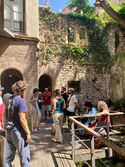

2026
The Heritage Laboratory - Belchite (Spain)
Fieldwork training program, Summer 2026
The Institute for Jewish Studies Barcelona (EJB) the Matanel Sefarad Seminar and The Spanish Association of Military Archaeology are happy to announce the 2026 cohort of the Heritage Laboratory - a fieldwork training program that will take place starting this coming summer in Belchite, Spain.
The Heritage Laboratory brings together students from all disciplines, along with educators, cultural heritage professionals, and social activists, for a two-week immersive study camp that combines archaeological fieldwork and heritage studies specializing in “difficult heritage.”

.jpeg)
.jpeg)
Program Overview
Participants will take part in the excavation of a recently discovered medieval synagogue at a site that later became a famous battlefield during the Spanish Civil War, and will also engage in a training seminar on “Difficult Heritage,” critically examining issues of representation, ownership, ethics, and responsibility when working with painful or contested pasts.
The Heritage Laboratory will encourage and support participants in initiating and developing research, educational, and applied projects in the field.
Language of instruction: English.
What is Difficult Heritage?
In heritage studies, the term Difficult or Dissonant Heritage refers to aspects of the past that are painful, shameful, or morally troubling for individuals and societies to remember and represent. It encompasses material remains, sites, memories, and narratives associated with conflict, violence, oppression, or trauma-elements of history that challenge collective identities and national pride.
Rather than commemorating a glorious or harmonious past, difficult heritage invites critical reflection and ethical engagement with uncomfortable histories. It encourages communities to confront how such legacies continue to shape present-day values, politics, and cultural memory, fostering a deeper understanding of the complexities of identity, responsibility, and reconciliation.
(For further reading, see: J. E. Tunbridge & G. J. Ashworth, Dissonant Heritage: The Management of the Past as a Resource in Conflict, 1995 - S. Macdonald, Difficult Heritage: Negotiating the Nazi Past in Nuremberg and Beyond, 2009. - Paul Gough, Sites of Conflict: Memorialisation and Representation of War in the 20th Century
Why Belchite?
Belchite, located in Aragón, Spain, is a town of layered history and striking ruins, where traces of medieval life intersect with the remnants of the Spanish Civil War.
As a multicultural medieval city that later became a famous battlefield (1937), Belchite offers a unique opportunity to explore centuries of coexistence, conflict, and memory within a single landscape.
Participants experience a living classroom, connecting the study of Jewish–Muslim coexistence in medieval Iberia with the archaeology of violence in modern conflict.
With its rich historical layers, Belchite serves as a living laboratory for understanding how societies confront and negotiate difficult pasts.
Program Dates
The Belchite Fieldwork program is structured in three two-week cycles (up to 10 fellows each).
Cycle 1: June 15 - 27 Cycle 2: June 29 - July 11 Cycle 3: July 13 – 25
participants may apply for one, several, or all cycles of the program.
Program schedule
Participants will engage in archaeological fieldwork five days per week, with one day allocated for educational excursions and one day designated for rest and personal activities.
Fieldwork will commence at 7:00 a.m. each weekday, to avoid the peak midday temperatures, and will continue until 12:30 p.m., followed by a lunch break.
During the midday break, participants will have access to the municipal swimming pool as well as the cafeteria-restaurant facilities.
Afternoon activities, taking place from 4:30 p.m. to 7:30 p.m., will consist of laboratory, and study sessions.
Evenings will be free, allowing participants the opportunity to rest, socialize, or explore the local area.
Affiliation
The Belchite Heritage Laboratory is co-directed by
Dr. Alfonso Fanjul Peraza (Asociación Española de Arqueología Militar) and Dr. Ze’ev Maor (The Institute of Jewish Studies, Barcelona - EJB) in cooperation with the Fundación Pueblo Viejo de Belchite - Belchite City Council.
The Belchite Heritage Laboratory forms an integral part of the Matanel Sefarad Seminar - Jewish Studies Program of the EJB, supported by the Matanel Foundation.



Registration, Fees, and Scholarships
Program Fees
Accepted participants receive a scholarship, making the total program fee €500 per two-week cycle.
Accommodation (shared – two people per room) will be provided in New Belchite, located approximately a 10-minute walk from the excavation site.
The town offers several affordable restaurants and supermarkets for daily needs. The accommodation includes a shared kitchen for self-catering and a free laundry facility.
Scholarships*
Scholarships covers all lectures, excursions, accommodation, and materials.
Please note: travel to and from Belchite, as well as personal expenses, are not included in the program fee.
How to Apply
-
Please access the application form, which provides detailed information about the program, registration options, scholarships, and more.
-
Fill in the required details on the form and submit your application
The application deadline is April 15, 2026.
Places are limited, and early applications are encouraged.
Applicants who apply early may receive early confirmation of acceptance.
Admission Process
Following the review of application forms and, if necessary, online interviews with shortlisted candidates, applicants will be notified regarding their admission to the program and eligibility for a scholarship.
Accepted participants will be asked to confirm their participation and submit a non-refundable deposit of €500 to secure their place in the program.


.jpeg)
F.A.Q.
Frequently Asked Questions
You will probably find the answer to your question here.
If not, please contact us directly
via e-mail info.ejbarcelona@gmail.com























